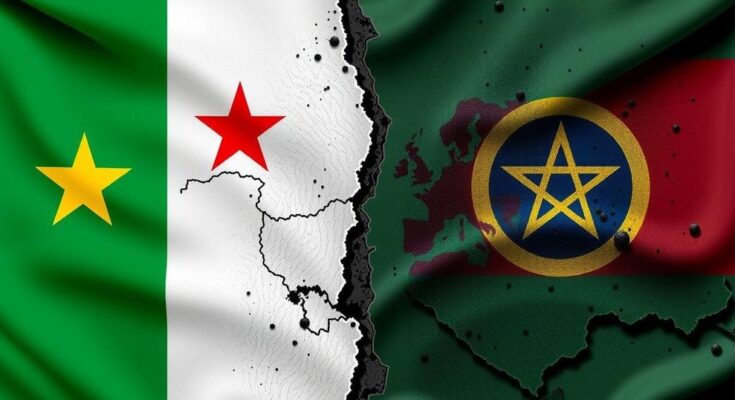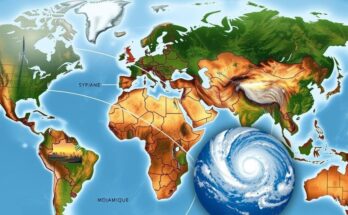This article discusses the dangerous implications of President Hassan Sheikh Mohamoud’s policies, which undermine Somaliland’s self-determination and obstruct Ethiopia’s trade access to the Red Sea. His actions risk escalating regional tensions, destabilizing alliances, and perpetuating Somalia’s internal conflicts, ultimately harming the broader Horn of Africa population.
The geopolitical landscape of the Horn of Africa is notably intricate, driven by historical, political, and economic factors that continue to influence the region’s dynamics. Among the pivotal players is the President of Somalia, Hassan Sheikh Mohamoud, whose recent policies pose a significant threat to the already precarious stability of this area. His refusal to recognize Somaliland’s claim for self-determination, coupled with efforts to hinder Ethiopia’s access to vital Red Sea ports, threatens to destabilize long-established alliances, aggravate regional tensions, and complicate the delicate geopolitical balance. Since its declaration of independence from Somalia in 1991, the Republic of Somaliland has forged a separate identity, establishing democratic governance, peace, and notable economic growth. Its geographic proximity to Ethiopia has allowed Somaliland to engage in various international agreements, such as the management of Berbera Port by DP World in conjunction with the UAE, thereby enhancing its role as a key economic player in the region—all while approximately 40 million Ethiopian citizens depend on trade routes leading to the Red Sea. President Mohamoud’s actions to obstruct these connections and implement sanctions present a considerable risk not only to Somaliland’s economic viability but also to Ethiopia’s overall economic stability. Analysts regard this as a miscalculation which may rekindle hostilities within the Horn of Africa, particularly targeting Ethiopia—an essential ally for maintaining regional stability. Ethiopia has strategically aimed to secure access to Red Sea ports, and Mohamoud’s attempts to inhibit this access could intensify already existing grievances. Moreover, the internal turmoil of Somalia exacerbates the situation. For over thirty years, Somalia has been mired in civil conflict, terrorism, and interference from external forces. While Somaliland has successfully maintained peace and advancement, Somalia remains heavily dependent on African Union troops to combat persistent Al-Shabaab threats. Mohamoud’s priority on undermining Somaliland, rather than focusing on stabilizing his war-torn nation, may hinder efforts to establish a credible government in southern Somalia. Additionally, Egypt’s engagement in the region complicates matters further. President Mohamoud’s alignment with Egypt, particularly in the ongoing tripartite agreement involving Egypt, Eritrea, and Somalia, presents a potential shift in regional power dynamics. Given Egypt’s vested interests in controlling the Nile River, it may exploit Mohamoud’s policies as a negotiating tool against Ethiopia, possibly inciting proxy conflicts, particularly in southern Somalia, with ramifications that could set back regional development efforts significantly. It is crucial for the international community to act promptly to endorse Somaliland’s right to self-determination and advocate for economic collaboration with Ethiopia. The symbiotic economic relationship that could flourish between Somaliland and Ethiopia—potentially benefiting 120 million Ethiopians—stands to foster regional prosperity. It is vital to ensure that personal grievances, sectarian biases, or envy do not obstruct meaningful progress in this critical area.
The Horn of Africa has always been characterized by deep-rooted historical and contemporary complexities influencing its political landscape. The emergence of Somaliland, which proclaimed independence from Somalia in 1991, is a cornerstone in understanding current dynamics. Somaliland functions as a separate state with a stable political system and burgeoning economic prospects. Conversely, Somalia remains embroiled in turmoil, grappling with internal strife and external threats, particularly from militant groups. Relationships in this region are shaped by a history of alliances and rivalries, particularly between Somalia and its neighbors, such as Ethiopia. The region’s geopolitical significance is further heightened by its strategic location near vital shipping routes, especially for landlocked nations like Ethiopia that rely on ports for trade. President Mohamoud’s policies challenge these existing relations and risk igniting further conflict in an already fragile region.
In summary, President Hassan Sheikh Mohamoud’s policies toward Somaliland and Ethiopia not only threaten to destabilize regional alliances but may also perpetuate historical hostilities. His refusal to recognize Somaliland’s independent status, alongside his attempts to curb Ethiopia’s access to essential trade routes, represents a political miscalculation that could harm the livelihoods of millions within the Horn of Africa. The urgent need for international advocacy supporting Somaliland’s self-determination and cooperation with Ethiopia is critical. The stakes are high; failure to address these tensions could hinder prospects for peace and progress in the region for generations to come.
Original Source: www.modernghana.com




